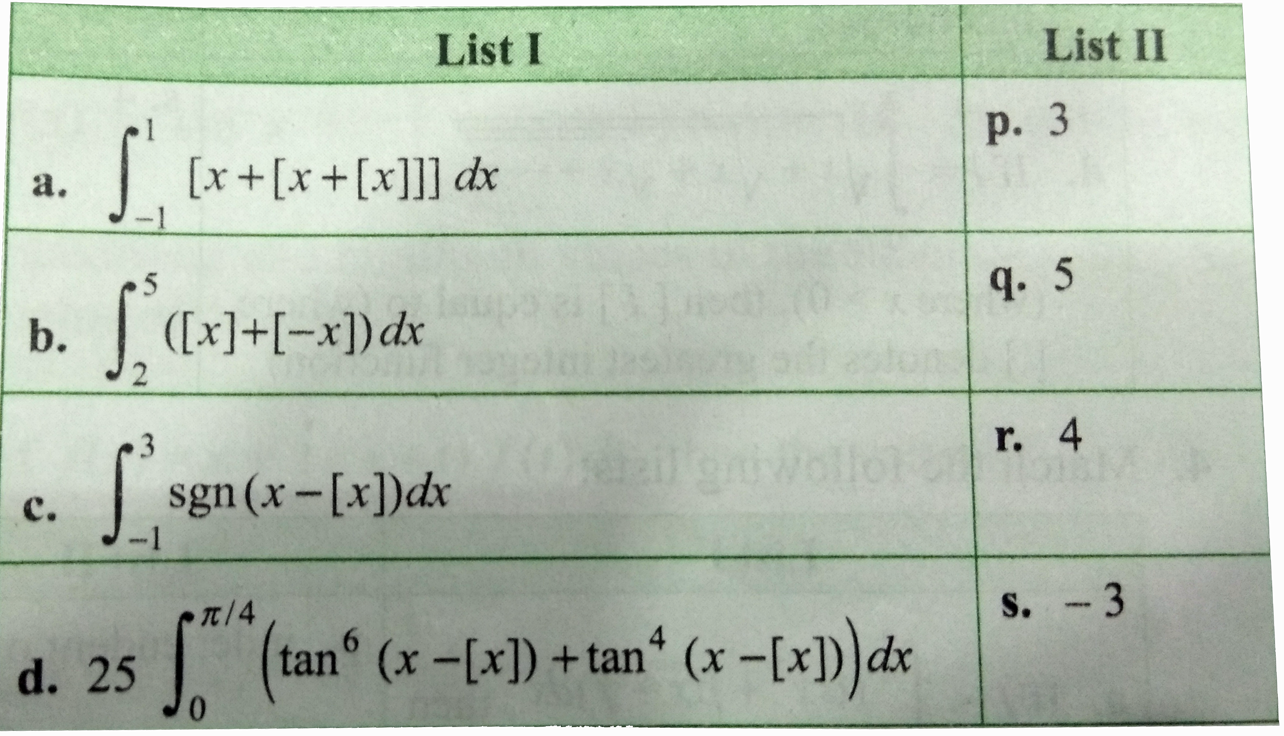Let u=∫∞0dxx4+7x2+1 and v=∫∞0x2dxx4+7x2+1 then find the value of u+vSolution in Bengali
π/3
π/6
π/12
π/9
The correct Answer is:B
u=∫∞0dxx4+7x2+1 and v=∫∞0x2dxx4+7x2+1
∴u+v=∫∞01+x2x4+7x2+1dx
=∫∞01x2+1(x−1x)2+9dx
=13[tan−1(x−1x3)]∞0
=13[π/2+π/2]=π/3
∴u+v=π/3
Now u−v=∫∞01−x2x4+7x2+1dx
Let x=1t or x=−dtt2
∴u−v=∫0∞1−1t21t4+7t2+1(1−1t2)dt
=−∫∞01−t2t4+7t2+1dt
=−(u−v)
∴u−v=0
From 1 and 2, we get u=v=π/6
Topper's Solved these Questions
- DEFINITE INTEGRATION Book:CENGAGE PUBLICATIONChapter:DEFINITE INTEGRATION Exercise:MATRIX MATCH_TYPE
Explore 6 Videos
- DEFINITE INTEGRATION Book:CENGAGE PUBLICATIONChapter:DEFINITE INTEGRATION Exercise:NUMERICAL VALUE_TYPE
Explore 28 Videos
- DEFINITE INTEGRATION Book:CENGAGE PUBLICATIONChapter:DEFINITE INTEGRATION Exercise:MCQ_TYPE
Explore 27 Videos
- CURVE TRACINGBook:CENGAGE PUBLICATIONChapter:CURVE TRACINGExercise:EXERCISES
Explore 24 Videos
- DETERMINANTBook:CENGAGE PUBLICATIONChapter:DETERMINANTExercise:Multiple Correct Answer
Explore 5 Videos
Similar Questions
If [.] denotes the greatest integer function, then match the following lists:

View SolutionIf the value of (lim)n→∞(n−32).∑6nj=1√j is equal to √N then the value of N8 is __________
View SolutionIf f(x) is integrable over [1,2], then ∫21f(x)dx is equal to
(a) (lim)n→∞1nn∑r=1f(rn) (b) (lim)n→∞1n2n∑r=n+1f(rn) (c) (lim)n→∞1nn∑r=1f(r+nn) (d) (lim)n→∞1n2n∑r=1f(rn)
View SolutionFind the derivative of y=sin2x−cosx
View SolutionIf x∈R,ai,bi,ci∈R for i=1,2,3 and ∣∣ ∣∣a1+b1xa1x+b1c1a2+b2xa2x+b2c2a3+b3xa3x+b3c3∣∣ ∣∣=0, then which of the following may be true ?
View SolutionLet f(x)=sinxandg(x)=(log)e|x| If the ranges of the composition functions fogandgof are R1andR2, respectively then (a) R1{u:−1≤u<1},R2={v:−∞v<0} (b) R1={u:−∞<u<0},R2={v:−∞<v<0} (c) R1={u:−1<u<1},R1={v:−∞V≤0}
View SolutionLet u=int_(0)^(oo)(dx)/(x^(4)+7x^(2)+1) and v=int_(0)^(x)(x^(2)dx)/(x^(4)+7x^(2)+1) then
View SolutionLet u=∫π/40(cosxsinx+cosx)2dx and v=∫π/40(s∈x+cosxcosx)2dx. Find the value of vu.
View SolutionIf P=int_0^oo(x^2)/(1+x^4)dx ; Q=int_0^oo(x dx)/(1+x^4)"and"R=int_0^oo(dx)/(1+x^4), then prove that :
View SolutionThe value of ∫∞0x[(1+x)(1+x2)]dx is (A) π4 (B) π2 (C) same as ∫∞0dx[(1+x)(1+x2)] (D) cannot be evaluated
View SolutionEvaluate ∫20(x24−7x+5) dx
View SolutionThe value of ∫∞0dx1+x4 is
View SolutionLetA=∫∞0logx1+x3dx Then find the value of ∫∞0xlogx1+x3dx in terms of A
View SolutionEvaluate: ∫∞0dx1+x2
View SolutionLet u=∫∞0dxx4+7x2+1 and v=∫∞0x2dxx4+7x2+1 then
View SolutionLet u=∫∞0dxx4+7x2+1 and v=∫x0x2dxx4+7x2+1 then
View Solution

